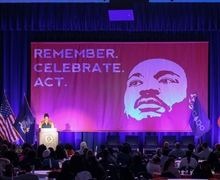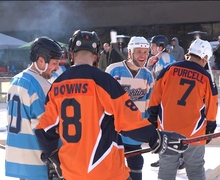SU community rallies around Turkish students in wake of nation’s deadliest earthquake
Cassandra Roshu | Asst. Photo Editor
TSA organized tabling efforts at the Schine Student Center and Bird Library to encourage the SU community to donate money for relief efforts via a GoFundMe, which has raised over $7,000 for necessities like tents, food and medical assistance.
Get the latest Syracuse news delivered right to your inbox.
Subscribe to our newsletter here.
In the aftermath of two earthquakes in Turkey and Syria last week, Ahmet Celik said his home country of Turkey will never be the same. The earthquakes, both with Richter scale magnitudes over seven, have left over 41,000 dead in the two countries.
Celik, a member of Syracuse University’s Turkish Student Association working to collect aid for the country, said the impact goes beyond the destruction on land.
“Almost every Turkish (person) everywhere around the world, either their friends, their families, somehow their loved ones (are) affected. So they all felt very deeply the pain of this,” Celik said.
The earthquakes hit just hours apart on Monday in the city of Kahramanmaraş in southeastern Turkey and in northern Syria. With over 35,000 confirmed deaths and rescue efforts still underway, the Feb. 6 earthquake is now the deadliest in Turkey’s history, surpassing the death toll of the 1939 Erzincan earthquake which killed around 33,000 people. Celik said he expects the death toll will rise between 50,000 to 100,000 as searches continue.
Amid the destruction, Turkish students at SU are working with university students, faculty and administration to create initiatives to provide support for those directly and indirectly affected by the earthquake.
Celik, a PhD student in SU’s Department of Religion, said he has multiple family members, including his mother and sister, who currently live in Diyarbakır near where the earthquake struck. In the wake of the disaster, Celik said Turkey is at a turning point in its national history.
“(If) you lose your hand, you will not remain the same,” Celik said. “A country who loses one-sixth of its part when it collapsed is not going to remain the same anymore. When you think in this way, you can understand better how big the tragedy was.”
Through work with SU’s administration and students, TSA President Ibrahim Kizil said the group coordinated Friday’s campus-wide message directly with Gretchen Ritter, SU’s vice chancellor, provost and chief academic officer.
TSA also organized tabling at the Schine Student Center and Bird Library to encourage the university community to donate money for relief efforts via a GoFundMe, Kizil said. The fundraiser, which TSA member Ilayda Ova worked to create, has received over $7,000 for necessities like tents, food and medical assistance.
Ova, also a PhD candidate in the Maxwell School of Citizenship and Public Affairs, said the earthquake affected an area of Turkey with at least 13 million people out of the nation’s total population of 83 million, ultimately over 15% of Turkey’s population. This includes 4.6 million children in Turkey and an additional 2.5 million children from Syria, according to UNICEF.
Joshua Russell, an assistant professor of seismology in SU’s Department of Earth and Environmental Sciences, said the earthquakes’ magnitude was abnormal given the events’ history in Turkey.
‘There have been five earthquakes greater than a magnitude of six that have happened in that region… Prior to that, there had only been three magnitude six earthquakes in the region over the past 50 years,” Russell said. “This region gets earthquakes quite often, actually, but of this magnitude is definitely unusual.”

Arlo Stone | Digital Design Editor
Kizil said some SU professors have contacted Turkish students to offer support and academic accommodations.
On Sunday, TSA members worked alongside Turkish residents of the city of Syracuse to pack boxes of supplies to send as aid to Turkey, Kizil said. Ova, whose uncle and cousin live in Kahramanmaraş, expressed her gratitude for the support she has received in the aftermath of the earthquakes.
“It’s helping me a lot because for the first two days, it was too much pain for just one person to shoulder,” Ova said. “But, after we started to work on this together, it’s really helped me feel that I am trying to do something to the best of my abilities.”
Michael Duignan, SU’s senior director for student engagement, highlighted the importance of the immediate mobilization on SU’s campus, which he said was largely orchestrated by students.
“It was really a partnership between offices, individuals and students who really were like ‘we want to do something in that passion,’” Duignan said. “You saw… some of that distress and pain, (and) you wanted to make sure you did everything in your power within the structures that we have in place to provide them the most support we can.”
TSA will continue with longer-term relief efforts, Ova said, and plans to create a bulletin board in Schine where Turkish students can write notes thanking the SU community for its donations and support.
Celik pointed to the support within the Turkish student community, saying students rallied around each other despite such immediate devastation.
“One of our purposes is that we as human beings know each other, we help each other,” Celik said. “We support each other, especially in the case of an emergency or people who are in need. That part of our life makes it meaningful.”
Published on February 16, 2023 at 12:41 am
Contact Dominic: dcchiapp@syr.edu | @DominicChiappo2






